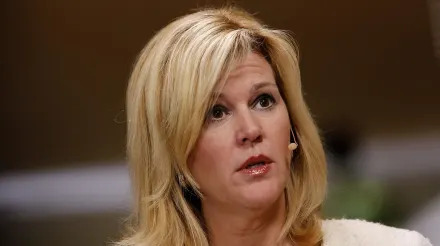Baby boomers own more homes than millennials and Gen Zers, creating a “generational schism” in the world of housing, according to Meredith Whitney, the “Oracle of Wall Street,” who predicted the Great Financial Crisis.
Boomers aren’t selling, and that’s a problem. “They’re not selling because they’re aging in place, because they can’t afford to go anywhere else,” Whitney said last week in an interview with CNBC. “Until they sell, you’re going to have this real standoff between sellers and buyers.”
So what’ll it take? Well, home prices have to fall; Whitney said prices need to drop about 20%. But that price decline would only take us to the price levels of three or four years ago before the pandemic and its corresponding housing boom. Plus, people would still have a lot of equity in their homes, Whitney explained, so it wouldn’t be a housing crash.
At this point, it doesn’t make sense for a lot of people to sell their homes because they have either locked in a low mortgage rate or own their home outright . To give that up would likely mean a much higher mortgage rate , and a much more expensive home. Considering an unwillingness to sell from older generations, that leaves fewer homes for younger generations to buy; those that are for sale are, in some cases, unaffordable because prices continue to rise since supply is tight—and mortgage rates are higher than what people are used to.
In some cases, people list their homes at exorbitant prices and sell if they get an offer, or stay if it doesn’t meet their expectation, Whitney said. Sales are depressed , particularly at the middle and lower tiers of the market, whereas luxury is sort of carried by all-cash offers, she added. “Something has got to give in the regular market,” Whitney said. “I think you’re going to start to see home prices go down.”
“For homes to be affordable, that’s going to have to happen,” she added. Whitney said she wrote a letter to whoever won the presidential election, telling them they have to let home prices drop, and it wouldn’t be the end of the world, for one, because “demand may be overstated.” (She didn’t provide any other details on the letter.)
In an interview with Fortune earlier this year, Whitney said she sees home prices falling 30% partly because young, single men are living at home, playing video games.
“Unless you’re creating a household, there’s no reason to buy a house,” she told me at the time.
That’s just one part of her prediction. The other phenomenon that could lower home prices is the so-called silver tsunami , which refers to baby boomers and the supposed millions of homes that’ll flood the market in the next decade as they age and downsize and their homeownership rates decline. The two together would mean more supply, less demand, and falling prices, Whitney said. But it wouldn’t be a housing crash, in her mind. Instead, it’d be almost a reversal of the soaring prices fueled by the pandemic and once ultralow mortgage rates, she argues.
But here’s the thing: Home prices almost never go down. And in our current housing cycle, a shortfall of homes, to the tune of millions, is fueling that trend. If the situation were to reverse itself as Whitney has predicted (through supply that outweighs demand), it could be plausible that home prices could fall. But others in the industry have dismissed the silver tsunami phenomenon, suggesting the incoming supply, freed up by baby boomers wouldn’t be overwhelming and would be offset by younger generations who want and need homes.


